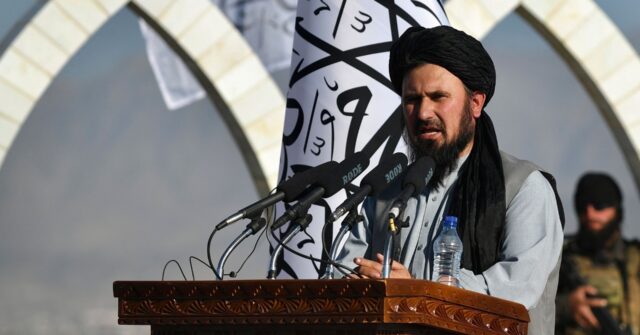Top Taliban spokesman Zabihullah Mujahid demanded that Washington consider handing over the former Afghan embassy in America to the jihadist terror organization in a recent interview, lamenting the lack of a “positive response” to the request so far.
Mujahid’s remarks, made in an interview with local media this weekend, preceded the fourth anniversary of the Taliban jihadist organization seizing power in Afghanistan and sending the legitimate government of that country fleeing. Taliban jihadists ruled Afghanistan for much of the 1990s but lost power during the American invasion in the aftermath of the September 11, 2001, attacks. After two decades of fighting, President Joe Biden broke an agreement with the Taliban that would have ended the American presence in the country in 2021, extending the war and prompting a fierce Taliban jihadist campaign.
Taliban terrorists reached the Kabul city lines on August 15, 2021, prompting then-President Ashraf Ghani to flee the city; by then, the formal Afghan military had collapsed.
Four years later, only one country formally recognizes the Taliban as the legitimate government of Afghanistan: Russia, which recently approved the arrival of a Taliban ambassador and has expanded friendly ties with the regime. Other rogue states, such as Iran and China, also maintain a cordial relationship with the Taliban, but merely recognize the jihadist cohort as an “interim” government, creating the illusion that it will one day be replaced with a more legitimate entity.
Speaking to Afghan national television, Mujahid repeated the Taliban talking point that the radical Islamists are not interested in war or other conflicts and are instead solely focused on expanding diplomatic ties and economic opportunities for the country.
“Afghanistan has no problems with any country and seeks good relations with all nations,” he said, according to a translation by the Afghan network Tolo News. “Russia understood Afghanistan’s intentions, took the initiative in this regard, and took advantage of the opportunity. We call on other countries to take such courageous steps and establish relations with Afghanistan.”
Discussing America specifically, Mujahid confirmed that some communication exists with Washington, but not a functional bilateral relationship.
“We have periodic contacts with the United States,” he noted. “As you saw some time ago, an American representative came to Kabul, and likewise, when our representatives travel to Qatar or elsewhere, they meet with American officials.”
President Donald Trump sent a team of diplomats to Kabul in March to successfully negotiate the release of George Glezmann, an American imprisoned for over two years in Afghanistan while traveling in the country. The Trump administration referred to the Taliban’s decision to free him as “positive and constructive,” potentially opening the door to similar deals to release other American hostages in the country.
Mujahid, in the interview this week, also stated that the Taliban hoped to convince the United States to allow it to control what was formerly the Afghan embassy in Washington, which was shut down in 2022 and remains inactive.
“We have requested official recognition from them and have also raised the issue of transferring the Afghan embassy in the United States to us,” he continued. “Although we have not received a positive response, the people of Afghanistan want their rights.”
The Taliban does not currently enjoy official representation in the United States as the government of Afghanistan – nor does it occupy Afghanistan’s position at the United Nations. The world’s refusal to recognize the Taliban as the “Islamic Emirate of Afghanistan” has significantly limited the Taliban’s ability to attract foreign investment and prevented it from accessing critical international state funding, fueling the terrorists’ repeated demands to be legitimized.
The comments this weekend were not the first time that Taliban representatives suggest America normalize ties with the group. In April, Taliban “Foreign Affairs Minister” Amir Khan Muttaqi said during a visit to Saudi Arabia that members of the jihadist group had repeatedly attempted to convince the U.S. government that it is representative of the Afghan people.
“We told the Americans that no power can control Afghanistan without the support of its people,” Muttaqi claimed. “This truth must be acknowledged, and engagement with this government must take place.”
“If there is insecurity and internal conflict in Afghanistan, the whole region will face unrest,” he warned.
Contrary to the Taliban’s claims to represent the people’s will, international human rights institutions have studiously documented a host of human rights atrocities committed by the jihadists in the name of sharia, or the Islamic law, since returning to power. The International Criminal Court (ICC) issued arrest warrants in July for the “supreme leader” of the Taliban, Hibatullah Akhundzada, and top judge Abdul Hakim Haqqani, specifically citing the outrageous abuse of the rights of women and girls.
“Specifically, the Taliban severely deprived, through decrees and edicts, girls and women of the rights to education, privacy and family life,” the ICC stated in its announcement of the arrest warrants, “and the freedoms of movement, expression, thought, conscience and religion.”
“In addition, other persons were targeted because certain expressions of sexuality and/or gender identity were regarded as inconsistent with the Taliban’s policy on gender,” it added.
The U.N. Assistance Mission in Afghanistan (UNAMA) published a report in July accusing the Taliban of a host of abuses, including “threats, cases of torture, mistreatment and arbitrary arrest and detention,” against Afghans returning to the country. While the Taliban has attempted to claim that the massive influx of Afghans into the country is a vote of confidence for the group, in reality, neighbors such as Iran and Pakistan have expelled hundreds of thousands of refugees in the past two years, forcing them to return to Taliban-controlled lands.
The Taliban announced on Monday that it had “summoned” UNAMA officials to complain about the reports of human rights abuses and vowed “necessary measures” to silence the humanitarian organization. Taliban officials also disparaged the report as “substandard.”
Follow Frances Martel on Facebook and Twitter.
Read the full article here


